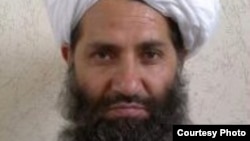The death of Taliban leader Mullah Akhtar Mansoor in a U.S. drone strike and the selection of the group's new head will do little to help the peace process in Afghanistan, Washington-based analysts told VOA's Afghan service.
The selection of Mullah Hibatullah Akhundzada as the Taliban's new leader over other hardliners, including the head of the Haqqani network, Sirajuddin Haqqani, had created a level of optimism that the group might intend to change course when it comes to peace talks with the Afghan government.
“From a policy point of view, we have to hope for the best but expect very little and keep our expectation modest and not adjust any of our other strategies as a result of any hopefulness about the peace talks,” said Michael O'Hanlon, the co-director of the Center for 21st Century Security and Intelligence at the Brookings Institution. “If you ask me to make a prediction, I would say, no I don’t think it will be successful for the simple reasons that this guy was a very quick consensus candidate out of a group that has a lot of hardliners in it.”
Lisa Curtis, a senior research fellow at the Heritage Foundation’s Asian Studies Center, believes that U.S. strategy in the region is linked with the Taliban's willingness to come to the negotiating table.
“I think if the U.S. keeps a similar strategy of not allowing the Taliban leaders to enjoy save havens in Pakistan, over time this certainly will have an impact on the Taliban’s ability to remain a cohesive fighting force and would make them more amendable to dialogue,” said Curtis.
Pakistan and extremist groups
The U.S. has long pushed Pakistan to do more against the havens of extremists on its territory.
Curtis believes that U.S. frustration with Pakistan hit a breaking point.
“I think the U.S. finally said we have given this process a chance. Pakistan has not shown willingness to use force against the Taliban, so the U.S. decided that it would demonstrate its willingness to use force against Taliban leadership that was unwilling to come to the table," Curtis said.
Pakistan has long argued that the country has done a lot to crack down on militants.
Mansoor's death
Jason Campbell, an associate policy analyst at the RAND Corporation, said that with the various interests and sides involved, it is very difficult to know for certain how the U.S. was able to get Mansoor's location to carry out the deadly drone strike.
“There are speculations that because he was unwilling to totally align with Pakistan’s interests, that perhaps there was some collusion between ISI [Pakistan’s intelligence agency] and the U.S. in the targeting of Mansoor,” Campbell added.
The strike against Mansoor marked a second high-profile target killed on Pakistani soil after Osama bin Laden, who was killed by U.S. Navy seals in May of 2011.
Curtis points to Pakistan’s reaction to the strike that took out Mansoor in comparison to the operation that killed bin Laden.
“They did not react strongly as they did five years ago when the U.S. conducted the raid that eliminated Osama bin Laden, for example, so we haven’t seen Pakistanis react with the same level of anger,” said Curtis.
She said that given Mansoor’s closeness to Pakistan, it is doubtful that Pakistan had anything to do with his elimination.





